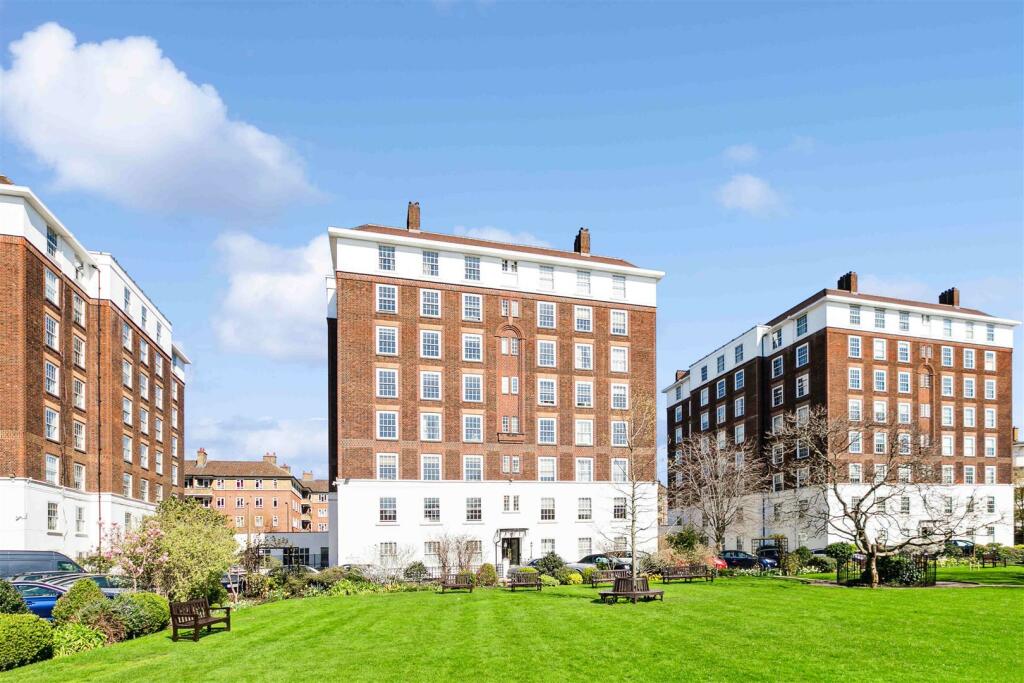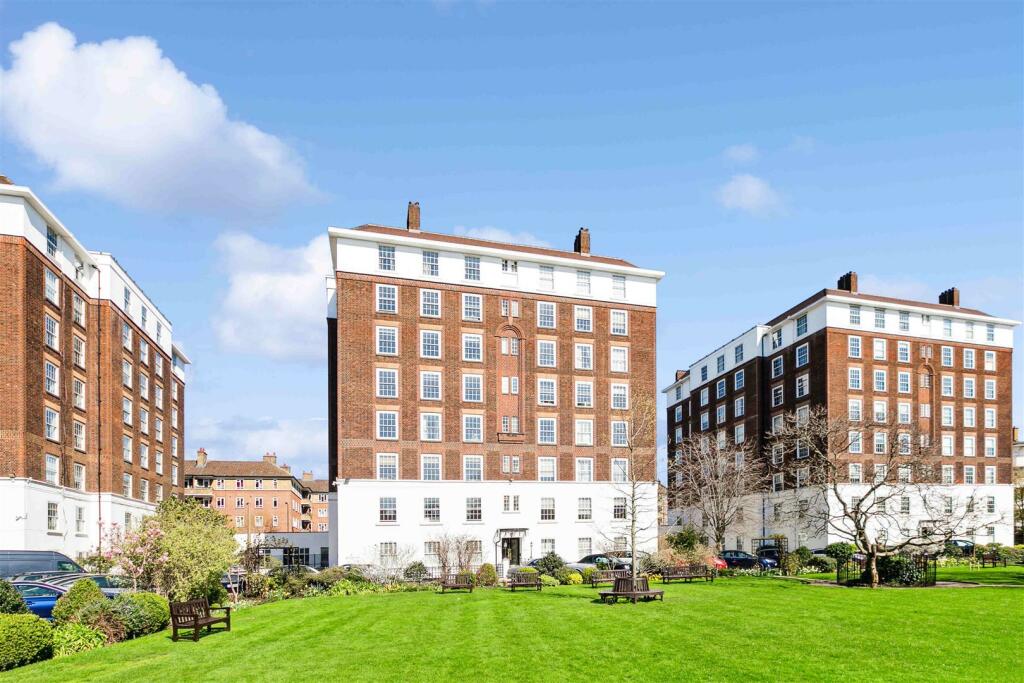Wealthy couple loses dispute regarding the noisy wooden floor of their neighbor: A businessman and his wife attempted to compel the City banker residing in the £1.1 million flat above them to remove the 'intolerable' creaking floorboards.
A prominent couple embroiled in a dispute over their neighbors disruptive wooden flooring has encountered a setback in their second legal challenge. Sergey Grazhdankin, 44, a businessman, and his spouse, Maria, asserted that their residence in a gated art deco complex in West Kensington, London, became a source of distress following the arrival of new neighbors in the £1.1 million apartment above them in 2018.

North End House. Their neighbours bought the apartment upstairs for £1.1million in 2018. Credit: Rightmove
Mr. Grazhdankin, who operates an insurance services firm, initiated legal action against his neighbors, City banker Medhi Guissi and his wife Meriem El Harouchi, after they removed the carpets and installed wooden flooring, resulting in what he described as 'unbearable' noise levels. The Grazhdankins contended that their quality of life was severely impacted by the daily sounds emanating from the young family residing above, including children playing and crying, creaking floorboards, footsteps, and loud conversations.
The contentious dispute first came before the courts in 2023, where a judge ruled in favor of the Grazhdankins, mandating their noisy neighbors to pay £16,087 in compensation for the period prior to the reinstallation of carpets. Despite this initial victory in November of that year, Mr. Grazhdankin returned to the High Court, arguing that the reinstalled carpets had not alleviated the issue of the persistent 'creaking' floors and that further remedial work was necessary. Challenging the previous ruling that deemed the ongoing creaking as typical for the flats, he contended that his neighbors should be compelled to undertake repairs to mitigate the noise. However, following a hearing at the High Court, Mr. Justice Adam Johnson dismissed his appeal, stating that the lower court had adequately assessed the situation and concluded that the noise levels were 'not outside the norm.'
In the initial trial held in 2023, the Central London County Court examined the case of Mr. and Mrs. Grazhdankin, who relocated to their fourth-floor flat in North End House, Fitzjames Lane, in 2011.

Sergey Grazhdankin
Their neighbors subsequently purchased the apartment above for £1.1 million in 2018. Prior to this, the Grazhdankins resided beneath an elderly woman and reported to the court that they seldom experienced noise disturbances from the upper flat, aside from occasional door slamming. However, following the acquisition of the property by Mr. Guissi and his spouse, extensive renovations commenced, which included the removal of walls, alterations to the room layout, and the replacement of the flooring.
The previous carpeted floor was replaced with a wooden floor featuring a floating acoustic barrier, intended to mitigate noise transmission. Despite these efforts, the Grazhdankins contended that the acoustic flooring had been improperly installed, with screws driven through it and into the joists, contrary to the manufacturers' explicit guidelines. They asserted that this 'improper' installation led to creaking sounds and a continuous transmission of both impact and airborne noise from the apartment above. In a statement submitted to the court, Mr. Grazhdankin noted that after spending a year in Germany, he and his family returned to the flat in August 2020. Upon their return, he and his wife, who works as a marketing manager, found the noise levels to be 'unbearable.'
'During the week, we are woken up daily between 5.30am and 7.30am by the noise from above and we can hear the floor making creaking sounds, walking sounds and the sound of moving furniture right above our main bedroom,' he said.
'On weekends we are woken up between 7am and 8am by walking, banging, jumping sounds, children running and voices.
'During the day, throughout the whole week, there is a lot of noise of similar nature, being creaking floor, walking, dropping things on the floor, moving objects on the floor, children crying, shouting and voices.
'This is experienced especially between 2pm and 10pm.
'Overall, living in our apartment feels like living in a shared apartment with another family. It is impossible to have our peace and live in our own rhythm.'
'Living with this every day since we moved is torture,' he added from the witness box.
His wife stated that the only moments they experienced relief from the noise overhead occurred after Mr. Guissi and his family retired for the night, which often happens after 10 PM, thereby rendering the Grazhdankins reliant on their neighbors' daily routines.
'We live with our neighbours in the most direct way of speech as we are always disturbed by the sounds of their daily life in their apartment,' she said in a statement.
'We are automatically able to tell not only if they're at home but also who exactly of the family is at home, which room they're in and sometimes what kind of activity they are engaged in.
'It feels depressing because I do not have a feeling of privacy, peace and quiet in my own home.'
Mr. Guissi and Mrs. El Harouchi ultimately had carpets installed in the majority of their apartment; however, the Grazhdankins continued to pursue their 'nuisance' claim against them. Do you concur with the judge's ruling to permit the floors to remain? Yes No Ruling, Judge Tracey Bloom ruled in favor of the Grazhdankins, determining that the noise they endured after their neighbors removed the old carpets was 'intolerable' and disrupted their sleep at night.
The Grazhdankins were 'clearly distressed' by the noise, which stemmed from improperly installed soundproof flooring, rendering it as ineffective as a 'piece of plywood' placed over the floorboards, according to the judge. She awarded them £16,087 in damages but notably concurred with one expert witness who stated that any persistent creaking noise following the installation of the carpets was not severe enough to be classified as a 'nuisance' under the law.
At the High Court, their barrister Mark Lorell continued to advocate for them, arguing that despite being 'very critical' of the upper floor, Judge Bloom had erroneously 'allowed it to remain.'
He asserted that there could be 'no comparison' between the experiences of the Grazhdankins and what might be deemed 'ordinary creaking in a house.' 'The judge assessed the evidence in a manner that no reasonable judge could have justified,' he contended. 'Her decision was based on her belief that this creaking is prevalent throughout the property—yet there is no evidence to support that claim.'
However, in denying the Grazhdankins' request to appeal, Mr. Justice Adam Johnson stated that he believed there was 'no realistic prospect' of a successful outcome. 'The appeal fundamentally challenges the judge's assessment of the evidence regarding whether the ongoing creaking constituted a continuing nuisance after the carpeting was installed,' he remarked. 'The evidence presented to the judge included findings from tests conducted by [two experts] Mr. Rogers and Mr. Anderson, both of whom detected some degree of creaking.'
'The difference between them was that Mr Rogers thought this a significant issue and Mr Anderson thought it not.
'It seems to me the view that Mr Anderson was expressing was that the level of noise he had detected was not outside the norm and was consistent with what he would expect in a property of this type.
'It is clear that the judge preferred the evidence of Mr Anderson on this and other topics. The core question is whether she was entitled to take that view.
'I am far from satisfied that the judge can be criticised...I decline to grant permission to appeal.'
The ruling allows the Grazhdankins' neighbors to maintain their flooring as it currently stands.
In conclusion, the High Court ruling allows the disputed noisy wooden flooring to remain, despite the Grazhdankins' claims of ongoing disturbances. With the appeal denied, their neighbors can keep the flooring, highlighting the challenges of nuisance cases and the difficulty in proving persistent disturbances in residential settings.





















